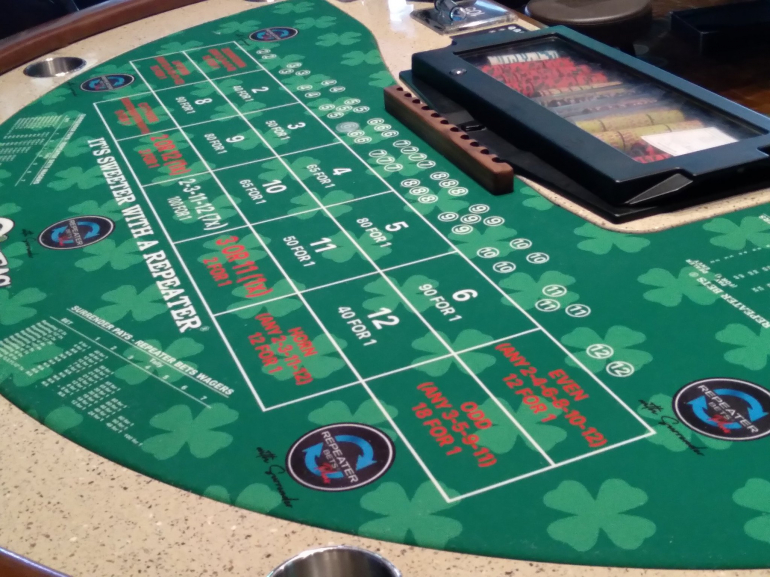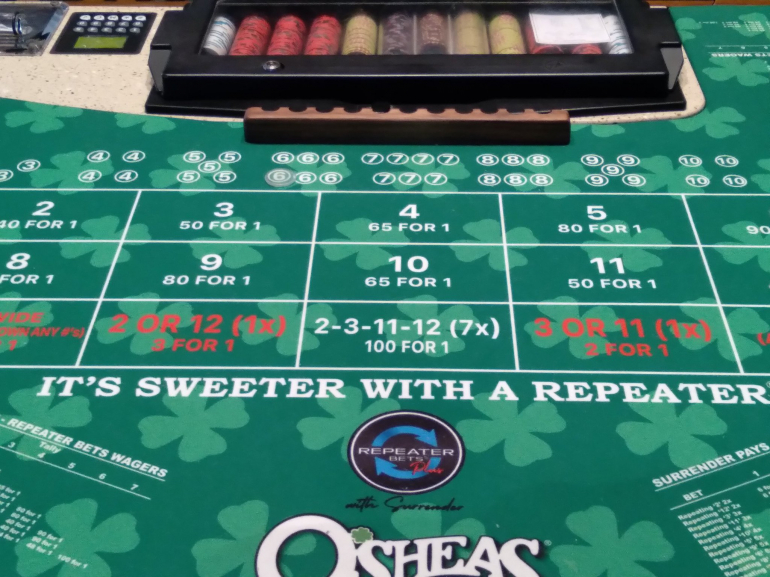Quote:O'Sheas has a new table game that I have never seen before. If I had to guess, I think it probably plays like sic bo. If anyone out there has played it, please let me know its concept.



https://twitter.com/john_mehaffey/status/1420114269199273991?s=21
If it�s just the repeater bet without the other craps bets, why are there seven 7 spots?
The large layout leaves little room for the players to put their bankroll. And it�s so large, it�s ripe for past posting.
But looky here, it's a full blown table game. I wonder how the dice are rolled. A cup?
Quote: charliepatrickJust looking at the 2/12 before 7 (3 for 1) and 3/11 before7 (2 for 1 - i.e. Evens) is terrible House Edge. I can see it as something that would work online, where once the next "game" starts and the rolls can be made automatically, fairly quickly, until the "7 -out"; but the odds need to be better.
I've noticed most patrons in the casinos we frequent don't understand house edge, the math behind it or what is a good or bad bet. People will still bet the 2 or 12 as it is the required repeater the fewest times and pays 3:1.
You have no idea how many times I've had people tell me I am stupid for laying max odds on the Don't in craps because I have to lay $2 to win just $1 and that is a bad bet. In reality, people like us know it is the best bet in the casino.
For instance, if there was a craps game where you only had to lay 5/4 on the 4 or 10 in craps, people like us would play that game all day every day, we'd try to get as much action on it as we could. There would still be drunk idiots who have no understanding of math or gambling tell us it's a bad bet!
Quote: DeMangoHow much money for 18 yo's?
Probably 54 to 55 billion for one, if they offered a similar bet using the " Sweeter with the Repeater" *** game table.
***: Must hit 18 yo's before a 7
So far I have only the images earlier to go off of. I can't see the four bets in red on the left side of the table and none of the surrender values. Hopefully I'll have a chance to visit the Linq soon to get all the rules.
This includes the Repeater bets as already found at some casinos and covered in my page on Repeater Bets.
Here is my analysis of them.
| Bet | Rolls | Pays | Probability | House edge |
|---|---|---|---|---|
| 2 | 2 | 40 | 0.020408 | 0.183673 |
| 3 | 3 | 50 | 0.015625 | 0.218750 |
| 4 | 4 | 65 | 0.012346 | 0.197531 |
| 5 | 5 | 80 | 0.010240 | 0.180800 |
| 6 | 6 | 90 | 0.008820 | 0.206209 |
| 8 | 6 | 90 | 0.008820 | 0.206209 |
| 9 | 5 | 80 | 0.010240 | 0.180800 |
| 10 | 4 | 65 | 0.012346 | 0.197531 |
| 11 | 3 | 50 | 0.015625 | 0.218750 |
| 12 | 2 | 40 | 0.020408 | 0.183673 |
They add some horn type bets that win if any one of a group of bets win. The Even bet wins if any of the even bets (2, 4, 6, 8, 10, or 12) win and pays 12 for 1.
Likewise, the odd bet pays 18 for 1.
A Horn bet pays 12 for 1 and wins if the 2, 3, 11, or 12 bet win.
Much easier mathematically are the following bets:
3 or 11: Wins if a 3 or 11 is thrown before a 7. Pays 2 for 1.
2-3-11-12 (7x): Wins if the shooter throws any horn number 7 times before a total of 7.
You can't just add the probabilities to get a probability of winning, because they are correlated. A correct closed-form answer is pretty trick and worthy of discussion. I plan to bring it up in the Easy Math Puzzles page once the current problem is satisfactorily answered.
The spoiler button below shows my analysis of those.
| Bet | Pays | Probability | House edge |
|---|---|---|---|
| Even | 12 | 0.065395 | 0.215265 |
| Odd | 18 | 0.043176 | 0.222839 |
| 3 or 11 | 2 | 0.400000 | 0.200000 |
| Horn | 12 | 0.062789 | 0.246528 |
| 2-3-11-12 | 100 | 0.007813 | 0.218750 |
If anyone can save me the trouble and give a full report on the game, please do!
As always, I welcome all comments, questions, and corrections.
I realized this when I was checking to see which bet had the lowest edge - you uncharacteristically did not include a summary where that would be mentioned.
Otherwise, it was a good write up on a very crappy bet.
Are they rolled on a traditional table and must hit the back Wall or rolled in a cage or what?
Quote: DJTeddyBearTable 3 is screwed up. You have bet 3 and 4 paying the same and with the same probability and value. The rest of the table is similarly misaligned.
Thank you for that correction. I just fixed it.
Quote: AlanMendelsonCan we see a wide shot of the table? I'm curious to see where the dice are rolled?
Are they rolled on a traditional table and must hit the back Wall or rolled in a cage or what?
There are a couple pictures in the OP. It seems to be played on a blackjack-size table or maybe a little bigger. I'd lay long odds they use small dice and a shaker, like in pai gow.
Quote: WizardThere are a couple pictures in the OP. It seems to be played on a blackjack-size table or maybe a little bigger. I'd lay long odds they use small dice and a shaker, like in pai gow.
Many years ago the Normandie Casino near LA (a poker casino) had card craps with a layout on a blackjack-sized table.
It was not a craps layout, but a layout with boxes to place bets as if you were at a craps table.
The dealer shuffled and chose from two decks of cards.
At the Bicycle Casino near LA when they had a craps table, players would not throw the dice but would shake two dice in a metal cup and then slam the cup on the table. The table was an actual craps table.
Win all ten repeater bets before rolling a 7: 10000 to 1
Win nine repeater bets before rolling a 7: 3000 to 1
Win eight repeater bets before rolling a 7: 1000 to 1
Win less than eight repeater bets before rolling a 7: Loss
What is the house edge?
Like the fire bet, only distinct wins are counted. So, for instance, if you win the 2 three times, that only counts as one win.
Quote: Ace2Assume there's a fire type bet on the repeater table that pays as follows:
Win all ten repeater bets before rolling a 7: 10000 to 1
Win nine repeater bets before rolling a 7: 3000 to 1
Win eight repeater bets before rolling a 7: 1000 to 1
Win less than eight repeater bets before rolling a 7: Loss
What is the house edge?
Like the fire bet, only distinct wins are counted. So, for instance, if you win the 2 three times, that only counts as one win.
HE = 1 - (53,324,716,837,842,948,521,834,101,764,952,860,337
,479,794,340,838,976,031,734,796,259,597,564,137,929,772,388
,502,720,082,602,106,738,570,389,723,014,763,695,730,257,656
,379,420,034,342,836,497,185,909,061,392,328,048,022,080,590
,390,489,749,983,045,954,828,817,245,768,988,934,637,454,950
,168,370,663,075,325,965,413,107,747,452,805,343,706,609,926
,459,970,444,551,250,523,392,073,018,569,576,096,269,676,229
/
233,473,783,448,792,965,933,524,695,321,952,589,528
,152,298,183,736,457,939,286,839,045,858,409,228,221,650,293
,884,563,811,194,059,089,436,386,958,994,014,107,363,325,671
,964,352,353,886,065,739,979,792,097,652,058,703,112,038,008
,000,165,195,476,192,011,093,871,027,070,114,747,396,048,797
,139,901,142,504,119,068,142,492,631,715,860,366,963,419,710
,442,438,656,000,000,000,000,000,000,000,000,000,000,000,000)
or about 77.1603%
Here is what I think is the Poisson-based method (the above answer is Markov-based):
Define:
P2 = P(2 rolled < 2 times) = e^(-x/36) * (1 + x/36)
P3 = P(3 rolled < 3 times) = e^(-x/18) * (1 + x/18 + (x/18)^2 / 2)
P4 = P(4 rolled < 4 times) = e^(-x/12) * (1 + x/12 + (x/12)^2 / 2 + (x/12)^3 / 6)
P5 = P(5 rolled < 5 times) = e^(-x/9) * (1 + x/9 + (x/9)^2 / 2 + (x/9)^3 / 6 + (x/9)^4 / 24)
P6 = P(6 rolled < 6 times) = e^(-5x/36) * (1 + 5x/36 + (5x/36)^2 / 2 + (5x/36)^3 / 6 + (5x/36)^4 / 24 + (5x/36)^5 / 120)
P7 = P(7 not rolled) = e^(-x/6)
10 wins:
((1 - P2)(1 - P3)(1 - P4)(1 - P5)(1 - P6))^2 * P7
9 wins:
2 P2 (1 - P2) (1 - P3)^2 (1 - P4)^2 (1 - P5)^2 (1 - P6)^2 * P7 / 6
2 P3 (1 - P3) (1 - P2)^2 (1 - P4)^2 (1 - P5)^2 (1 - P6)^2 * P7 / 6
2 P4 (1 - P4) (1 - P2)^2 (1 - P3)^2 (1 - P5)^2 (1 - P6)^2 * P7 / 6
2 P5 (1 - P5) (1 - P2)^2 (1 - P3)^2 (1 - P4)^2 (1 - P6)^2 * P7 / 6
2 P6 (1 - P6) (1 - P2)^2 (1 - P3)^2 (1 - P4)^2 (1 - P5)^2 * P7 / 6
8 wins:
4 P2 (1 - P2) P3 (1 - P3) (1 - P4)^2 (1 - P5)^2 (1 - P6)^2 * P7 / 6
4 P2 (1 - P2) P4 (1 - P4) (1 - P3)^2 (1 - P5)^2 (1 - P6)^2 * P7 / 6
4 P2 (1 - P2) P5 (1 - P5) (1 - P3)^2 (1 - P4)^2 (1 - P6)^2 * P7 / 6
4 P2 (1 - P2) P6 (1 - P6) (1 - P3)^2 (1 - P4)^2 (1 - P5)^2 * P7 / 6
4 P3 (1 - P3) P4 (1 - P4) (1 - P2)^2 (1 - P5)^2 (1 - P6)^2 * P7 / 6
4 P3 (1 - P3) P5 (1 - P5) (1 - P2)^2 (1 - P4)^2 (1 - P6)^2 * P7 / 6
4 P3 (1 - P3) P6 (1 - P6) (1 - P2)^2 (1 - P4)^2 (1 - P5)^2 * P7 / 6
4 P4 (1 - P4) P5 (1 - P5) (1 - P2)^2 (1 - P3)^2 (1 - P6)^2 * P7 / 6
4 P4 (1 - P4) P6 (1 - P6) (1 - P2)^2 (1 - P3)^2 (1 - P5)^2 * P7 / 6
4 P5 (1 - P5) P6 (1 - P6) (1 - P2)^2 (1 - P3)^2 (1 - P4)^2 * P7 / 6
(P2 (1 - P3)(1 - P4)(1 - P5)(1 - P6))^2 * P7 / 6
(P3 (1 - P2)(1 - P4)(1 - P5)(1 - P6))^2 * P7 / 6
(P4 (1 - P2)(1 - P3)(1 - P5)(1 - P6))^2 * P7 / 6
(P5 (1 - P2)(1 - P3)(1 - P4)(1 - P6))^2 * P7 / 6
(P6 (1 - P2)(1 - P3)(1 - P4)(1 - P5))^2 * P7 / 6
Multiply the 10-wins value by 10,001
Sum the 9-wins values, and multiply by 3001
Sum the 8-wins values, and multiply by 1001
Add these three values together to get the expected return; HE = 1 - ER
That is the correct answer !Quote: ThatDonGuy
HE = 1 - (53,324,716,837,842,948,521,834,101,764,952,860,337
,479,794,340,838,976,031,734,796,259,597,564,137,929,772,388
,502,720,082,602,106,738,570,389,723,014,763,695,730,257,656
,379,420,034,342,836,497,185,909,061,392,328,048,022,080,590
,390,489,749,983,045,954,828,817,245,768,988,934,637,454,950
,168,370,663,075,325,965,413,107,747,452,805,343,706,609,926
,459,970,444,551,250,523,392,073,018,569,576,096,269,676,229
/
233,473,783,448,792,965,933,524,695,321,952,589,528
,152,298,183,736,457,939,286,839,045,858,409,228,221,650,293
,884,563,811,194,059,089,436,386,958,994,014,107,363,325,671
,964,352,353,886,065,739,979,792,097,652,058,703,112,038,008
,000,165,195,476,192,011,093,871,027,070,114,747,396,048,797
,139,901,142,504,119,068,142,492,631,715,860,366,963,419,710
,442,438,656,000,000,000,000,000,000,000,000,000,000,000,000)
or about 77.1603%
Here is what I think is the Poisson-based method (the above answer is Markov-based):
Define:
P2 = P(2 rolled < 2 times) = e^(-x/36) * (1 + x/36)
P3 = P(3 rolled < 3 times) = e^(-x/18) * (1 + x/18 + (x/18)^2 / 2)
P4 = P(4 rolled < 4 times) = e^(-x/12) * (1 + x/12 + (x/12)^2 / 2 + (x/12)^3 / 6)
P5 = P(5 rolled < 5 times) = e^(-x/9) * (1 + x/9 + (x/9)^2 / 2 + (x/9)^3 / 6 + (x/9)^4 / 24)
P6 = P(6 rolled < 6 times) = e^(-5x/36) * (1 + 5x/36 + (5x/36)^2 / 2 + (5x/36)^3 / 6 + (5x/36)^4 / 24 + (5x/36)^5 / 120)
P7 = P(7 not rolled) = e^(-x/6)
10 wins:
((1 - P2)(1 - P3)(1 - P4)(1 - P5)(1 - P6))^2 * P7
9 wins:
2 P2 (1 - P2) (1 - P3)^2 (1 - P4)^2 (1 - P5)^2 (1 - P6)^2 * P7 / 6
2 P3 (1 - P3) (1 - P2)^2 (1 - P4)^2 (1 - P5)^2 (1 - P6)^2 * P7 / 6
2 P4 (1 - P4) (1 - P2)^2 (1 - P3)^2 (1 - P5)^2 (1 - P6)^2 * P7 / 6
2 P5 (1 - P5) (1 - P2)^2 (1 - P3)^2 (1 - P4)^2 (1 - P6)^2 * P7 / 6
2 P6 (1 - P6) (1 - P2)^2 (1 - P3)^2 (1 - P4)^2 (1 - P5)^2 * P7 / 6
8 wins:
4 P2 (1 - P2) P3 (1 - P3) (1 - P4)^2 (1 - P5)^2 (1 - P6)^2 * P7 / 6
4 P2 (1 - P2) P4 (1 - P4) (1 - P3)^2 (1 - P5)^2 (1 - P6)^2 * P7 / 6
4 P2 (1 - P2) P5 (1 - P5) (1 - P3)^2 (1 - P4)^2 (1 - P6)^2 * P7 / 6
4 P2 (1 - P2) P6 (1 - P6) (1 - P3)^2 (1 - P4)^2 (1 - P5)^2 * P7 / 6
4 P3 (1 - P3) P4 (1 - P4) (1 - P2)^2 (1 - P5)^2 (1 - P6)^2 * P7 / 6
4 P3 (1 - P3) P5 (1 - P5) (1 - P2)^2 (1 - P4)^2 (1 - P6)^2 * P7 / 6
4 P3 (1 - P3) P6 (1 - P6) (1 - P2)^2 (1 - P4)^2 (1 - P5)^2 * P7 / 6
4 P4 (1 - P4) P5 (1 - P5) (1 - P2)^2 (1 - P3)^2 (1 - P6)^2 * P7 / 6
4 P4 (1 - P4) P6 (1 - P6) (1 - P2)^2 (1 - P3)^2 (1 - P5)^2 * P7 / 6
4 P5 (1 - P5) P6 (1 - P6) (1 - P2)^2 (1 - P3)^2 (1 - P4)^2 * P7 / 6
(P2 (1 - P3)(1 - P4)(1 - P5)(1 - P6))^2 * P7 / 6
(P3 (1 - P2)(1 - P4)(1 - P5)(1 - P6))^2 * P7 / 6
(P4 (1 - P2)(1 - P3)(1 - P5)(1 - P6))^2 * P7 / 6
(P5 (1 - P2)(1 - P3)(1 - P4)(1 - P6))^2 * P7 / 6
(P6 (1 - P2)(1 - P3)(1 - P4)(1 - P5))^2 * P7 / 6
Multiply the 10-wins value by 10,001
Sum the 9-wins values, and multiply by 3001
Sum the 8-wins values, and multiply by 1001
Add these three values together to get the expected return; HE = 1 - ER
Quote: Ace2That is the correct answer !
Well, the answer is right, but I think one of the Poisson values is wrong.
I think the "10 wins" value should be 1 - (((1 - P2)(1 - P3)(1 - P4)(1 - P5)(1 - P6))^2 * P7 / 6).
Why wouldn't the original one be right? Isn't that the probability of making all 10 numbers along with the probability of not making 7 in time x?
Quote: Ace2I don�t understand the question
Within a time period of duration x:
The probability of rolling at least two 2s is 1 - (e^(-x/36) * (1 + 1/36))
The probability of rolling at least three 3s is 1 - (e^(-x/18) * (1 + 1/18 + (1/18)^2 / 2))
...
The probability of rolling at least three 11s is 1 - (e^(-x/18) * (1 + 1/18 + (1/18)^2 / 2))
The probability of rolling at least two 12s is 1 - (e^(-x/36) * (1 + 1/36))
The probability of not rolling a 7 is e^(-x/6)
You would think the probability of doing all 11, thus winning the "repeater fire bet", would be the integral over x = 0 to positive infinity of the product of these 11 values, but it's not.
Take the product of such probabilities for all ten points times the probability of zero sevens times 1/6 to get:
((1 - ((5x/36)^5/120 + (5x/36)^4/24 + (5x/36)^3/6 + (5x/36)^2/2 + (5x/36) + 1) * e^(-5x/36)) * (1 - ((x/9)^4/24 + (x/9)^3/6 + (x/9)^2/2 + (x/9) + 1) * e^(-x/9)) * (1 - ((x/12)^3/6 + (x/12)^2/2 + (x/12) + 1) * e^(-x/12)) * (1 - ((x/18)^2/2 + (x/18) + 1) * e^(-x/18)) * (1 - ((x/36) + 1) * e^(-x/36)))^2 * e^(-x/6) * 1/6
Plug that into the integral calculator to get the exact answer shown below. This formula is slightly more efficient than the one I posted on easy math puzzles since it gets you the answer directly (instead of the complement of the answer). You multiply by 1/6 to avoid overcounting.
228296650211142223842235175926562819565310943733017295518075498704612736041415500474174790373335885790742403815919759376329015547908450301690458558920417797769549693735380351101698849553401942470326707347462797442543279964206576929140810851250499537038847980599155971380821671855091570073172919198633489 /
42257698361772482521904922230217663263013990621490761617970468605585232439497131274911233268994399835192106236921993503595172067323864679436391989136613954326164471151500091945731257099763259926492493587351085501547293599982107240564537220360657324137622979804472478269440000000000000000000000000000000000000
=~ 1 in 185,000
If you didn�t end with a seven, then a winning string at, for instance, x=8 can get counted again at x=9, since some winning strings at x=9 were already in a winning state at x=8 (and maybe at x= 7.2564897567 and at x= 6.2 etc). Ending with a seven ensures a winning string gets counted only once
Quote: DeMangoHow much money for 18 yo's? now thats funny
link to original post


